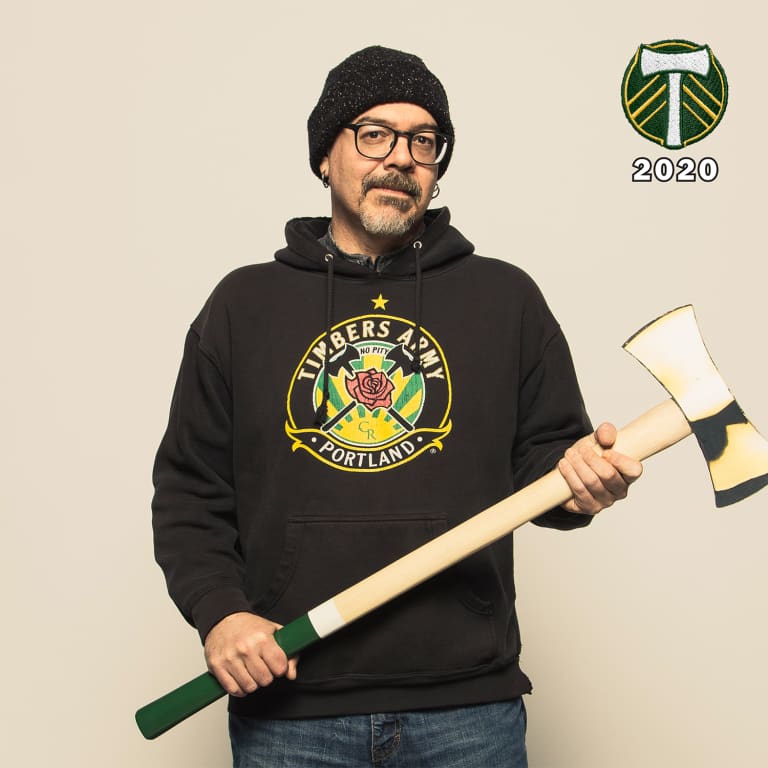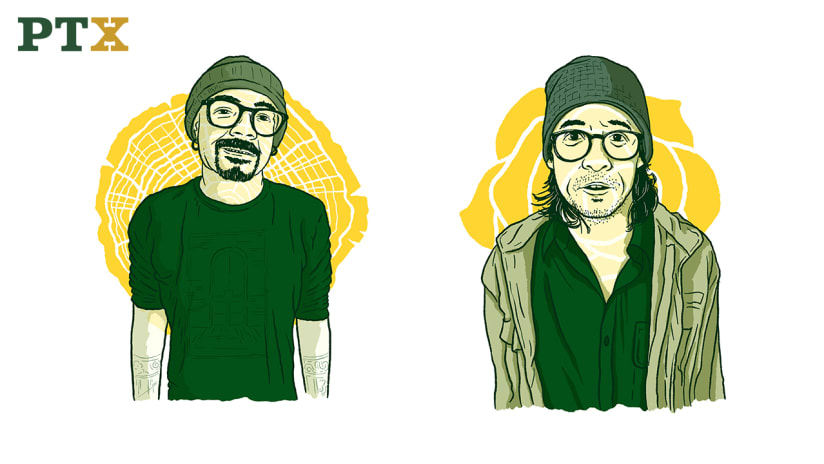Over the course of the Portland Timbers’ tenth season in Major League Soccer, we’ll sit down with dedicated fans and discuss what it means to be a part of this particular family. Portland soccer means the world to all of us, but we all come to it a little differently—we’ll find supporters who have deep histories with the Timbers and we’ll speak with newcomers to the cause. Mostly, we’ll just listen to the ways the Portland Timbers make life better for the Citizens of our Republic.
Greg Rucka
and
Matt Fraction
go to Timbers games together when they can. For reasons unique to each, they find Providence Park’s special magic to have a unique and positive power in their lives. They sat down with us a few weeks ago to talk about it, muse upon it, and to tell us how they got here.
Greg has been writing professionally for over 20 years. In addition to work at both Marvel and DC Comics, he is the creator of
Stumptown
,
The Old Guard
, and
Lazarus,
as well as almost two dozen novels, including the
Atticus Kodiak
series.
Matt Fraction is the prolific comic book writer behind
Hawkeye, Casanova, The Invincible Iron Man,
and more. In the last year he’s written
Superman’s Pal Jimmy Olsen
for DC Comics and a graphic novel cycle called
November
.
They’re each award-winning artists, dedicated supporters, and eloquent on what it means to love the Portland Timbers.
How and when did you become Timbers supporters?
Matt:
I got into it entirely because of Greg, and I came to it confrontationally, in the way that many Americans can accrue contempt prior to investigation. I’m a baseball guy…I didn’t know the game and my understanding was predicated on American television coverage of soccer, which prior to the last 15 years was a 4x3 square of a guy in a park. So I thought…bigger goal? Or smaller goal but no goalie — give me something. Surely there’s got to be–
How long ago was this?
Matt:
Oh, five or six years. It was only recently that I had a Paul on the road to Damascus thing.
Greg:
I think it was like six years ago…the end of the ’14 season because the following season they won MLS Cup — because you and I had a brief discussion about whether or not we would try to go, and you informed me that under no circumstances would you be in Columbus in December.
Matt:
And I have not stopped regretting it. Anyway, how it happened was that my father had died and I was pretty blue and Greg said, “Well you should come to a match — worst case, we sit in a nice park for a couple hours and talk. In the course of that day, and for the first time understanding the size of the pitch…and I had just begun long-distance running…to see it in person, I understood the scale for the first time…I had three things happening that day: Understanding the sport for the first time – as much as a neophyte can; understanding that scoring a goal is the hardest thing in the world, and—
Greg:
You had what I think of as the
Diego Chara
Awakening—there’s a whole different level of athleticism at work here.
"You just have to scream
yourself hoarse
for the
guys in green."
Matt:
They were running miles a game while other people were trying to stop them…while trying to do another thing. It was raw, emotional, explosive…and to see what it means here. I was fairly itinerant until I got to Portland and I never really felt at home until I got here. I had for the first time the experience of civic pride. And to have such a Portland experience at Providence Park — it’s like a party for Portland over there. It is everything awesome about the city, all at once. And the legacy of the story…well, the team was this, and then they were this, and this happened and that happened — getting into the mythology of things as a part of Portland’s identity…and then just being with Greg — I got my first wrap, and my first chant card. I was in.
OK—how about you?
Greg:
My dad played American football, and it cost him his knees. So he really wanted me to play soccer. So that was early/mid-’70s, in California… I remember trying to watch the game on TV and they would literally show seven minutes of the game, go for three minutes of commercials, and come back, and the score has changed, and – you didn’t see it. They tried letterboxing it with the ads – they did not know how to shoehorn it into the American broadcast model. On weekends we’d watch “Soccer Made in Germany” and I didn’t know what the hell I was watching half the time because I didn’t realize it was an edited show. For years I thought Beckenbauer was a position, because the commentator would say, “Beckenbauer, and…Beckenbauer, and Beckenbauer,” and I’d be thinking “I don’t know what a Beckenbauer is.” I was pretty good in high school, but I was more into girls and theater than being a good defensive midfielder, so by the time I got to college it was entirely recreational when I played. So, we moved up to Eugene for grad school and my father came up for a women’s national team game in 2001 at Civic Stadium…which I thought was pretty great. A few years pass, my professional life is making me miserable, I see that season tickets for the Timbers are available, and for whatever reason I decided, “THAT will make me happy!” So I bought season tickets for the whole family for the inaugural MLS season – and I discovered that the only time I was genuinely happy, like really content and OK with everything in my life, was the moment I was in the park…finding my seat, and just sitting there, and watching it fill, hearing it fill, on a late spring day, on a summer evening, it’s sincerely one of the few things that makes me simply, genuinely happy. It is not a complicated thing. It is a moment of peace and beauty and feeling OK, in a world that isn’t, at all. But if I can spend four hours in a little green cathedral, where the rules are clear—even if they are misapplied at times – with 25,000 other people…and it’s Portland, so they’re mostly people that I would agree with and get on with – but even if I wouldn’t, for the time that I’m there we’re all there for the same thing. And I can pick all of that apart, but that’s no fun, and what I need it to be is what I’m telling you it is for me. There’s something tragic in that, but there’s also something rather delightful.
What do the Timbers mean to Portland?
Greg:
It’s so Portland to back the soccer team. It fits the city. It ties to the history – it goes all the way back to the ’75 team the seeded the city with soccer. There’s a soccer culture here. You go out to Delta Park – I take my son to games at Delta, there are what, 10-12 pitches out there, full, all the time, all weekend long.
Matt:
It’s a naturally growing resource.
Greg:
However the city came to the game, the city educated itself about the game. People are soccer literate in Portland, and that is a separate thing from being a soccer fan. In my dog park in Northeast, there’s a guy who’s a longstanding member of the Army, and I guarantee you, it doesn’t matter who’s there, there will be a conversation. About what’s wrong and what has to be fixed. Or the Army’s relationship with the city — it’s all part of the fabric. You know, I don’t know how much longer I’m going to be in Portland, and certain things pain me when I think about leaving…and one of those is not being able to go to matches. It’s an extraordinary experience—and you can’t discount the Army in that…it’s such a commitment to being a supporter’s section.

Matt:
It’s a commitment to
commitment.
To see, in a town where irony runs rampant, something so sincere. There’s nothing in air quotes about it. No — I am going to scream and scream and scream until a ref’s head explodes.
So Matt, what do you think it all means?
Matt:
The history is
real –
we do like our authenticity. There’s a story – in a town where so many people are recently relocated, this is a thing that has predated many of us. And: It is unifying. It’s a shame our stadium isn’t big enough for a World Cup game because when people from other places come here for a game they say, “Oh, this is what it’s like back home.” It’s such a unifying point of purpose and pride – it feels sometimes like the pulse of the city in a way that few other things are. It’s such a passionate game – and a weirdly interpretive game.
What do you mean by that?
Matt:
Because half of the 20,000 can see that that thing that you just said happened…did not f*ing happen, and yet the entire course of this game has now been changed, because you blew a whistle, and you thought you saw a thing, but the rest of us can assure you – you did not see that thing. There’s a poetry and a chaos to it.
I will believe to my dying day that the Army yelled that ball out of the goal, that it was a sound wave that made it hit both posts
. It was an act of sonic concussion.
Greg:
The overriding ethic is, “Come in, come on in. Come love it with us.
This
is why we sing, ‘Can’t Help Falling in Love’…
this
is who
Timber Jim
is…
this
is why it’s important…it’s not arcane, it’s not hidden, it’s not secret. Initialization is really simple: You just have to scream yourself hoarse for the guys in green.
About the author: Dennie Wendt is a twenty-year veteran of storytelling in the shoe (and soccer) business and is the author of the soccer novel, Hooper's Revolution. He spent a year in the '80s on the junior team at Proleter Zrenjanin, when that was still Yugoslavia. He’s written for Salon, Portland Magazine, and Howler Magazine.












